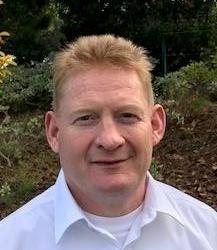Discovery and development of antiviral nucleosides: The story of Remdesivir (GS-5734), a broad spectrum antiviral agent for the treatment of Ebola
Speaker
Richard Mackman
Vice President of Medicinal Chemistry, Gilead Sciences
Event Details
1-2pm: Lecture by Dr Richard Mackman
2-3pm: Refreshments and networking
Description
Many antiviral drugs ranging from acyclovir for the treatment of Herpes, to more recent antiviral therapies that combine drugs to treat HIV or cure Hepatitis C have been approved by regulatory agencies. Nucleoside-based inhibitors of viral polymerases, an enzyme essential for the replication of the viral genome, are frequently the backbone of antiviral treatments. There are however significant challenges to the development of nucleoside therapeutics including efficient delivery to the infected tissue in humans, intracellular activation of prodrugs, and host-viral selectivity. Case studies from HIV, HCV and RSV antiviral nucleoside programs highlight these challenges and provide the foundational background for the discovery story of Remdesivir (RDV, GS-5734) for the treatment of Ebola.
Remdesivir is a prodrug of a novel adenosine analog, and a rare example of a broad spectrum antiviral agent with the potential to treat multiple RNA viruses including filoviruses, pneumoviruses, flaviviruses, paramyxoviruses and coronaviruses. Effective treatments for emerging viruses with high outbreak potential are severely limited, a realization that reached global prominence during the 2013-16 Ebola virus (EBOV) outbreak that claimed >11,000 lives. At the time of this outbreak, a focused screening effort in collaboration with USAMRIID and the CDC identified a nucleoside lead that was subsequently optimized to the prodrug RDV. Mechanism studies support RDV as being a delayed chain terminator of Ebola RNA synthesis. In EBOV-infected monkeys, once daily IV administration initiated on day 4 post infection demonstrated 100% survival in an otherwise lethal challenge model. Efficacy has also been observed in animal models of Marburg, Nipah and MERS-Coronavirus infections supporting the broader potential for RDV use in the treatment or other RNA viruses. RDV has been provided for compassionate use in the latest DRC Ebola outbreak and is the only small molecule antiviral being investigated in an ongoing Ebola randomized controlled trial.
Meet the speaker
 Dr. Richard Mackman is Vice President of Medicinal Chemistry at Gilead Sciences where he has spent 18 years developing novel antiviral therapies and leading teams of medicinal chemists. He earned a BA in Natural Science from Cambridge University in 1988, and a PhD, also from Cambridge in 1992, in the total synthesis of natural products. He then completed a
Dr. Richard Mackman is Vice President of Medicinal Chemistry at Gilead Sciences where he has spent 18 years developing novel antiviral therapies and leading teams of medicinal chemists. He earned a BA in Natural Science from Cambridge University in 1988, and a PhD, also from Cambridge in 1992, in the total synthesis of natural products. He then completed a
2 year post-doctoral fellowship with Prof. Paul Ortiz de Montellano at the University of California, San Francisco, on P450 enzyme architecture before starting his industrial career at CV Therapeutics and later Axys Pharmaceuticals.
In 2001 he joined Gilead Sciences and has led projects and chemistry teams aimed at developing novel therapeutics for viruses including HIV, HCV, RSV, HBV, and emerging viruses such as Ebola and Dengue. These programs have resulted is multiple clinical candidates including GS-9131 a novel nucleoside phosphonate for the treatment of HIV, GS-9688 a selective toll-like receptor 8 agonist for the treatment of HBV, the RSV fusion inhibitor Presatovir, and Remdesivir (GS-5734), an RNA polymerase inhibitor for the treatment of Ebola. During his career he has published extensively in the area of antiviral therapeutics, co-authored more than 80 publications, and is named as a co-inventor on more than 40 patents. In 2019 he was elected to Fellow of the Royal Society of Chemistry and is the recipient of the 2019 Antonin Holy Memorial Award from the International Society of Antiviral Research.
About Bertram Dillon Steele Lecture

The Bertram Dillon Steele Lecture commemorates UQ’s founding Professor of Chemistry, Bertram Dillon Steele, one of the original four professors appointed to the University.
Professor Steele was also the first president of the University’s Professorial Board (now known as the Academic Board) and chaired the Royal Commission on Prickly Pear, once an environmental scourge in Queensland.
The lecture was founded in 1982 by the UQ Chemical Society within the then Department of Chemistry.
The lecture was not offered in 2020 and 2021 due to the COVID-19 pandemic. From 2022 it is offered every second year, alternating with the School's other chemistry public lecture, the T. G. H. Jones Memorial Lecture.
Read more about Professor Steele on our history page.
